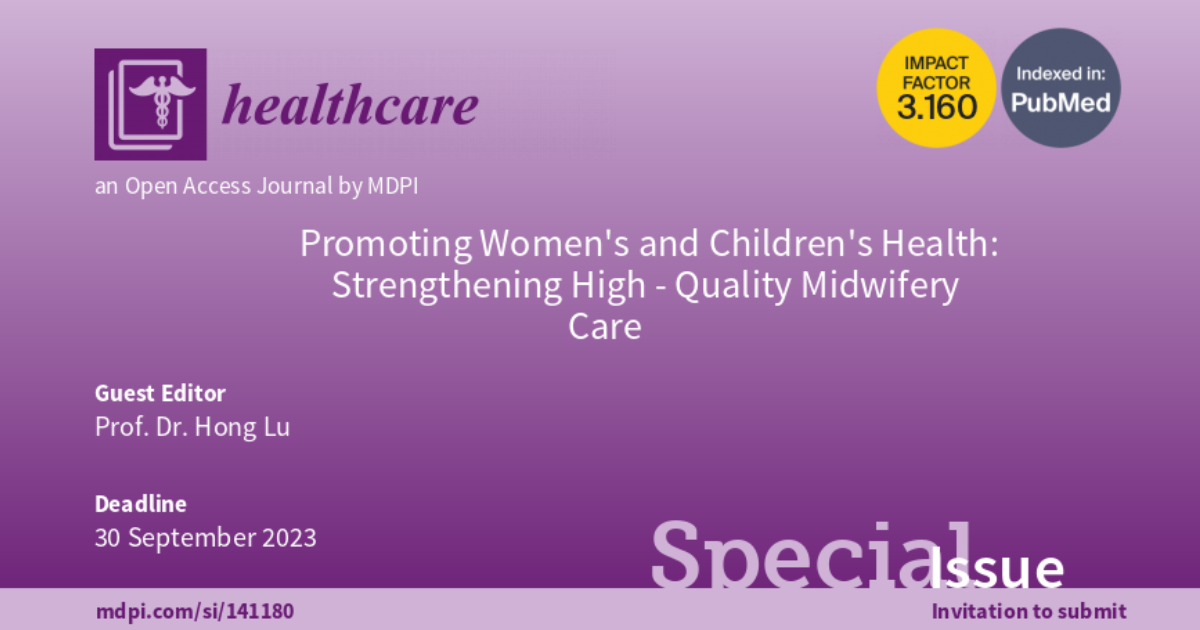- 2.7Impact Factor
- 4.7CiteScore
- 22 daysTime to First Decision
Promoting Women's and Children's Health: Strengthening High-Quality Midwifery Care
Special Issue Information
Dear Colleagues,
Sexual, reproductive, maternal, newborn, and adolescent health (SRMNAH) is an essential component of the Sustainable Development Goals (SDGs). Midwives, as core members of the SRMNAH workforce, can meet about 90% of the need for essential SRMNAH interventions across the life course. The positive impact of high-quality midwifery care on women and families across the globe is richly detailed. Midwives, when educated, licensed, and fully integrated into a supported environment can provide a wide range of clinical interventions and contribute to broader health goals, such as advancing primary healthcare, addressing sexual and reproductive rights, promoting self-care interventions, and empowering women. Universal coverage of midwife-delivered interventions could avert two-thirds of maternal and neonatal deaths as well as stillbirths, allowing 4.3 million lives to be saved annually by 2030. Midwifery-led continuity of care, in which midwives support women throughout the antenatal, intrapartum, and postnatal continuum, makes a difference to women’s and newborns’ health outcomes. However, the structure and organization of healthcare systems, in addition to the economic, social, and cultural contexts in which they operate, differ widely between countries, in turn influencing the models of maternity care available to women.
The goal of this Special Issue, “Promoting women's and children's health: strengthening high-quality midwifery care”, is to highlight the recent advances and challenges in high-quality midwifery care. We welcome original research, reviews, and other papers that address these challenges and encourage submissions that cover a broad range of topics, including clinical, educational, political, social, and cultural aspects as well as experiences with women and child health promotion through strengthening high-quality midwifery care.
This Special Issue will be of interest to researchers, midwives, clinicians, educators from various fields, policymakers, officials, and politicians for enabling and empowering the midwife workforce.
Prof. Dr. Hong Lu
Guest Editor
Manuscript Submission Information
Manuscripts should be submitted online at www.mdpi.com by registering and logging in to this website. Once you are registered, click here to go to the submission form. Manuscripts can be submitted until the deadline. All submissions that pass pre-check are peer-reviewed. Accepted papers will be published continuously in the journal (as soon as accepted) and will be listed together on the special issue website. Research articles, review articles as well as short communications are invited. For planned papers, a title and short abstract (about 100 words) can be sent to the Editorial Office for announcement on this website.
Submitted manuscripts should not have been published previously, nor be under consideration for publication elsewhere (except conference proceedings papers). All manuscripts are thoroughly refereed through a single-blind peer-review process. A guide for authors and other relevant information for submission of manuscripts is available on the Instructions for Authors page. Healthcare is an international peer-reviewed open access semimonthly journal published by MDPI.
Please visit the Instructions for Authors page before submitting a manuscript. The Article Processing Charge (APC) for publication in this open access journal is 2700 CHF (Swiss Francs). Submitted papers should be well formatted and use good English. Authors may use MDPI's English editing service prior to publication or during author revisions.
Keywords
- women and child health
- midwifery care
- health promotion
- healthcare system
- healthcare policy

Benefits of Publishing in a Special Issue
- Ease of navigation: Grouping papers by topic helps scholars navigate broad scope journals more efficiently.
- Greater discoverability: Special Issues support the reach and impact of scientific research. Articles in Special Issues are more discoverable and cited more frequently.
- Expansion of research network: Special Issues facilitate connections among authors, fostering scientific collaborations.
- External promotion: Articles in Special Issues are often promoted through the journal's social media, increasing their visibility.
- e-Book format: Special Issues with more than 10 articles can be published as dedicated e-books, ensuring wide and rapid dissemination.

